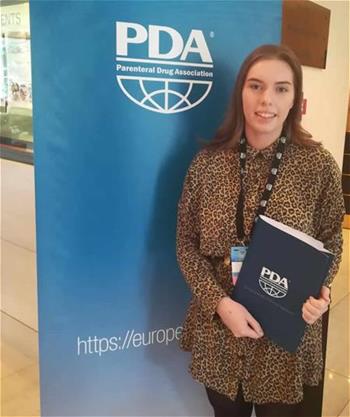Conference Proves “Virtually” Stimulating

PDA Ireland Chapter Award Winner Sees Future of Pharma at 4th PDA Europe Annual Meeting
Did you know that when training subjects read a document, they only remember 10% of information?
This was one of the many things I learned at the 4th PDA Europe Annual Meeting June 25–26. As a recipient of a scholarship from PDA’s Ireland Chapter, I was honored to attend this conference as a student and representative of the chapter.
The first day of the conference began with a regulatory update covering developments by EMA, the U.S. FDA, WHO and PIC/S. For the remainder of Day 1 and the majority of Day 2, the event was split into three parallel tracks with different topics at the center of each track. The sessions in each of these tracks varied and included discussions on virtual reality, manufacturing technologies, robotics, blockchain, decontamination, sterilization technologies, artificial intelligence and personalized. As a biotechnology student, I was immediately drawn to the sessions on robotics, virtual reality and artificial intelligence.
During the session on virtual reality, the speakers conveyed how industries need to update training methods to keep up with evolving technologies. I learned that this is already being applied in the form of e-learning, but more recently, a concept called “deep training” has come into use thanks to virtual reality. This type of training could be used to train manufacturing associates in a controlled manner as there is no risk of losing product due to simple errors. Trainees wear virtual reality goggles and carry out tasks in an area set up similar to a cleanroom. The equipment monitors the speed at which the user operates at; this has the potential to be very useful as it would make the user more informed and conscious about how many particles they are creating when they are moving in the cleanroom. This option also makes it possible to simulate situations that would rarely happen in the real cleanroom leading to operators being more prepared and confident in challenging situations.
This session is where I learned that trainees remember 90% of information by simulating an activity compared to 20% from hearing the information and only 10% of information by reading.
Next, I attended the session on robotics in pharma. During this presentation, we were shown a real example of a robot that could be used in many industries in the future. It recognizes obstacles in its path and rediverts in a safe way to avoid them. The speakers talked about how robots could eventually take over specific important roles that humans currently play in the industry. As humans create up to 80% of contamination in cleanrooms, this could be revolutionary. As well as carrying out tasks effectively and efficiently, the robots would free up time for workers to carry out other activities.
The final presentations I attended were those on artificial intelligence. An interesting point that was made in this section was that “artificial Intelligence is not always correct, but it is less incorrect than humans.” I found it hard to believe that computer systems could perform tasks that previously required human input, but I now know that this is the direction many businesses will be moving toward as there are many benefits to this type of technology. An example of where this could be used in industry is in the visual inspection process. This is a time-consuming task which requires complete concentration from the inspector, so I can see the benefits of this being carried out by a computer system. Apart from the tracks, there were also exhibitions at each break where the newest technologies, methods and equipment were displayed and explained in great detail.
The 4th PDA Europe Annual Meeting opened my eyes to all the new possibilities under development all over the world at this moment. No doubt, in a few years, the technologies mentioned above will be taking over operations in industry and making workplaces more efficient and productive. It was a privilege to listen to each of the speakers as they shared an abundance of valuable knowledge surrounding the most recent introductions and changes to the world of medicine, science, and healthcare. I am so grateful to the PDA Ireland Chapter for providing me with this fantastic opportunity, and I would like to say a special thank you to all of the Irish delegates who made me feel so welcome to the event and also those who helped to organize the trip. It was so enjoyable, and I loved every second of the beautiful city of Amsterdam!


